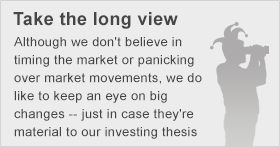
The Dow Jones Industrials (^DJI +0.60%) saw some volatile moves early Wednesday, as investors initially celebrated the beginning of earnings season but then pulled back as they tried assess the condition of the broader market. The index was up 35 points as of 12:30 p.m. EDT. Yet many market participants are waiting for the release of minutes from the June meeting of the Federal Open Market Committee, trying to assess the impact they could have on the Dow and on policy-sensitive stocks Goldman Sachs (GS +0.98%) and JPMorgan Chase (JPM +0.99%).

Federal Reserve building in Washington, D.C. Source: Flickr Creative Commons (image creator: DonkeyHotey).
Out of date before they're even released
One big problem that investors will have in assessing the latest minutes is that a lot has happened since the FOMC meeting in question. When committee members gathered in mid-June, investors hadn't yet seen two key pieces of economic data: the 2.9% drop in first-quarter GDP in the government's final estimate, followed by the huge gain of 288,000 jobs in June's employment report.
Most investors were reluctant to put much weight on the GDP number, arguing that weather-related impacts were one-time aberrations and therefore shouldn't have a long-term effect on economic growth. In addition, they largely took June's job gains as confirmation of the recovery from the sluggish winter months, and many analysts now believe the Fed might start to raise short-term interest rates sooner than initially predicted.
For years, though, the Federal Reserve has thwarted predictions of more aggressive moves to end its accommodative monetary policy stance. Countless times, the central bank has taken the stance that it should err on the late side in raising rates, rather than tightening monetary policy too early and risking an ill-timed economic slowdown.
Moreover, we've already gotten hints about what happened last month from Fed Chairwoman Janet Yellen's comments at the post-meeting press conference. Yellen said the Fed hadn't made definitive conclusions about its future course, either in terms of shrinking its multitrillion-dollar balance sheet or in when and how quickly rates could rise back to more typical levels. In past meetings, we've seen evidence of members taking different positions about the best course of future policy, but the few members who argued for faster action have thus far remained solidly in the minority.

What the financials want
What the Fed says will affect Goldman Sachs' and JPMorgan Chase's businesses in a couple ways. On one hand, rising interest rates will present challenges to both banks. JPMorgan Chase has relied on relatively wide net interest margins to support profits in its retail banking segment. Any hit to those margins could create another hit to earnings at a time when higher rates have already affected mortgage volumes. Rising rates would also lead corporate borrowers to pull back on bond issuance, which is a key market for Goldman Sachs.
Yet any uncertainty introduced by the Fed about the future could be positive for JPMorgan and Goldman. Wall Street has suffered from a general lack of trading activity, and part of that trend has stemmed from the predictability of the Fed and the market's response to its monetary policy moves. Uncertainty begets the volatility that traders -- and the trading operations of Goldman Sachs and JPMorgan Chase -- can exploit to their advantage.
Today's Fed minutes are more likely to prompt conjecture about how the central bank will respond to newer economic reports than to give hard answers about the future. Nevertheless, Dow investors should keep an eye on the minutes just in case they include any unexpected surprises.







